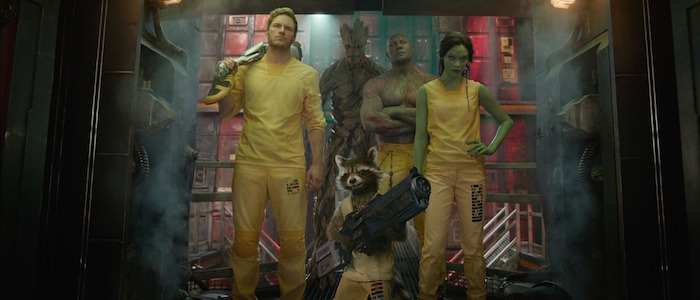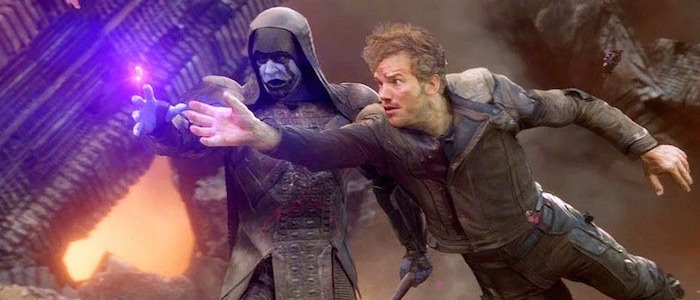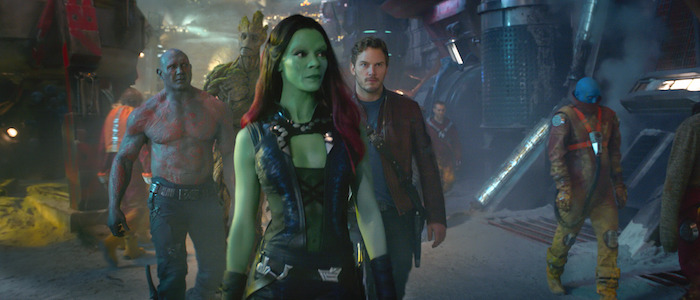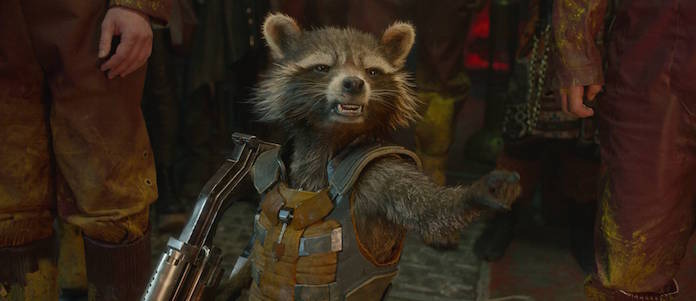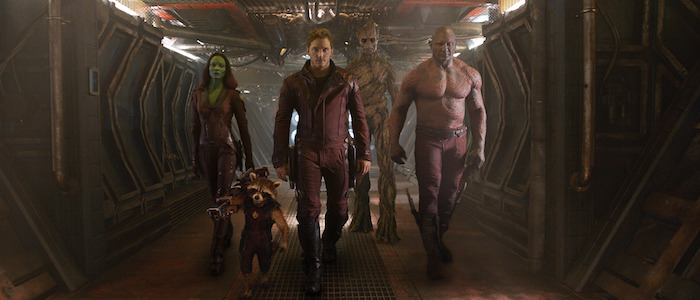Road To Endgame: 'Guardians Of The Galaxy' Was A Vital Step Into The Larger Marvel Cosmos
(Welcome to Road to Endgame, where we revisit the first 22 movies of the Marvel Cinematic Universe and ask, "How did we get here?" In this edition: Guardians of the Galaxy leans into the comics but falls just short of greatness)Hot off the heels of Captain America: The Winter Soldier (a film that many described as a "spy thriller"), James Gunn's Guardians of the Galaxy was both grimy, yet bursting at the seams with colour. It felt like a bright new world that had been used up and spit out, not unlike its characters. By pivoting away from Marvel's supposedly "real world" musings, the film finally shifted the series away from its paradoxical approach to American military power, albeit temporarily. Instead, the film opted for a world where fascist ideologies could be comfortably cartoonish.From an idyllic, multi-species utopia to a floating space-penitentiary, to a mining colony within the head of an ancient God, Guardians of the Galaxy was, to put it mildly, a departure from its Earth-bound predecessors. The film marked Marvel Studios going full-on Marvel Comics, bringing with it the requisite band of multi-coloured misfits, whose intersecting character arcs — while occasionally incomplete — formed an alluring tapestry.
Game of Tones
Guardians of the Galaxy bears a structural similarity to superhero standard-bearer The Avengers, which ought not to work in its favour. After Marvel forced together a billionaire, a soldier, a rage-monster, an archer, a spy and a Norse God (in the hopes that they'd be greater than the sum of their parts), James Gunn was tasked with a similar feat using an even stranger roster.The disparate players in the film come not only from varying planetary backgrounds, but from multiple genres and tones. Marvel had thus far established itself as the quintessential quip-laden action franchise. Gunn certainly adhered to this modus operandi, but the series now needed to blend the classicism of comic greats like Jim Starlin (creator of Thanos) with the naturalistic comedy stylings of Chris Pratt (Parks and Recreation).In Thor and The Avengers, Thor and Loki were outsiders, and their regal demeanor on Earth was a punchline. The likes of Drax the Destroyer (Dave Bautista) and Peter Quill (Pratt) however, exist side-by-side as a matter of simple fact. The operatic grandeur of lines like "You are an honorable man. I will fight beside you. And in the end, I will see my wife and daughter" are made to feel right at home alongside juvenile semen jokes about Jackson Pollock and references to Footloose, delivered as if on an improv stage.Gunn wields these dueling approaches with finesse, grounding each end of the tonal spectrum in elements of character. Gamora (Zoe Saldana) for instance, a woman escaping the rigid vice of despotic orator, begins by delivering poetry like "Whatever nightmares the future holds are but dreams compared to what's behind me," before learning to loosen up and invoke Kevin Bacon.Meanwhile Groot (Vin Diesel), a sentient tree with an otherworldly, Miyazakian disposition, acts as a moral check on his partner Rocket (Bradley Cooper and Sean Gunn), the trash-talking, Joe Pesci-inspired cybernetic racoon. In James Gunn's anything-goes mosaic, booming threats to "bathe the star-ways in your blood" (the first appearance of Mad Titan Thanos, played by Josh Brolin), feel right at home alongside Yondu (Michael Rooker) speaking literal gibberish with a Southern lilt. Rather than reconciling these hilarious disparities, Gunn simply approaches them with a straight face and treats them as a given.After The Avengers, big-risk (see: weird) blockbusters like Guardians of the Galaxy entered the realm of possibility. Characters crossing over from different genres was no longer a winking, Abbot and Costello Meet Frankenstein affair. It was now a normal occurrence, and one audiences would accept so long as it could be grounded in character.
My Little Star-Lord
Guardians of the Galaxy was woven together by Super director and Troma alumnus James Gunn, likely hired for his penchant for humanizing the weird and for dramatizing loneliness. The film's bizarre cocktail doesn't just work because wildly divergent characters stand shoulder-to-shoulder. It works because they're bound thematically.Gunn was given relative carte blanche to re-write the characters as he saw fit. As much as Guardians was James Gunn making a Marvel movie — one that fit Marvel's comedic tone, as well as its cinematography & colour-grading — it was also James Gunn telling a personal story on the largest possible canvas.Marvel's first man-out-of-time was a super soldier who clung to the righteousness of World War II. Its second, however, is Peter Quill a.k.a Star-Lord, a man-child stuck in the '80s, a decade whose popular artifacts re-appear in modern media ad nauseum. Quill makes constant allusions to American pop culture of the era (and its now-commodified nostalgia), but his appreciation for these relics of his childhood is entirely sincere.Quill isn't just childish for childishness' sake. He's locked in arrested development, forever frozen in his refusal to reach out and take his mother's hand in the moments before she died. Shielding himself from feeling her loss meant stunting his growth — by far the easier option for a child kidnapped and forced to live among an all-male crew of space pirates.Once a sweet, righteous boy who got into fights protecting frogs, the first thing we see Quill do as an adult is kick around innocent space lizards. Ironically, he does so while listening to the mixtape his mother left him; he even calls himself Star-Lord, fashioning an outlaw persona after his mother's nickname for him. Though, any expression of why this music or moniker might matter tends to manifest as aggression. Quill lashes out, often violently, at anyone who touches his Walkman; emotional vulnerability knocks constantly at his door, but he lacks the means to let it in, even in moments of genuine heroism. When he risks his life to save Gamora, he turns her adoration of his selflessness into an opportunity to gloat.Quill hasn't reached out to anyone in decades. But when he's inadvertently placed at the head of a mismatched posse — a group that has it as bad as he does; in some ways, worse — he finally steps up to take charge. At first, he does so out of greed, but he eventually sticks with the team because there's more to him than apathy. It's just been waiting for a chance to show itself, as have the best qualities in all the other Guardians.
Gamora
Quill isn't the only character with intimacy issues. The first time Gamora gets to slow down and feel something, a rare scene in which Quill shares his music, she recoils from their brief romantic touch, as if on sheer instinct, and puts a knife to his throat. Everyone seems to want her dead — she's a daughter of the genocidal Thanos, after all — so she's understandably hesitant to let her guard down.Gamora is a headstrong addition to the Marvel roster. Her vulnerabilities are further explored in Guardians of the Galaxy Vol. 2, though her foundation here is done a disservice. She acts as a check on the other Guardians, at least on paper. This works in their favour to some degree, but Gamora's function as a near-absolute moral compass prevents her from wrestling with her own morality.From the moment she appears on-screen, Gamora is already plotting to betray her father. Her immediate, un-hesitant defection makes for not only a diluted individual arc, but a lesser collective arc for the Guardians as well. There's little dramatic function to Drax telling Gamora about his murdered wife and daughter — he does so in their very first scene together, since she was complicit in Ronan and Thanos' crimes — because Gamora is then faced with actions she already agrees are heinous. She isn't challenged the way she is in the sequel.Guardians like Quill, Drax and Rocket reckon with their actions before coming together. The clear-eyed, clear-souled Groot doesn't need to, but Gamora is left hanging in stasis. Her function, up until the "standing in a circle" scene, is to have an un-flinching perspective. But this perspective rarely challenges the Guardians in ways that change them. The other characters mostly change through introspection. Gamora, sadly, isn't offered this luxury.
The Other Guardians
Characters like Rocket Raccoon and Drax the Destroyer lack Gamora's moral compass, and for good narrative reason. They look only inward until the situation is dire.Drax, consumed by anger and a thirst for revenge, is a literalist on a linear path. He's only swayed from his desire to kill Gamora once he's convinced she might be useful. His wounds are genuine, having seen his wife and daughter killed in front of him, but he's laser-focused on retribution to the point of endangering his teammates.Drax doesn't realize the consequences of his actions until Rocket chews him out. Rocket's grudge in this moment stems from the way Drax treats him in the casino on Knowhere; Drax has no means of disguising his language, so he likely doesn't mean any harm, but humiliating Rocket in public by calling him a "rodent" unearths Rocket's nascent trauma.Torn apart and re-assembled in a lab experiment, Rocket leans on his uniqueness as a means to obscure the fact that being one-of-a-kind also means being alone. It also means walking around constantly pissed off about it, though his anger (and the anger of the other Guardians) isn't really explored until the sequel.Groot is the only character whose words can't hurt Rocket. The only thing he can say is "I am Groot," which Rocket is free to interpret, however Groot also serves as a shining example for the rest of the Guardians. They spend most of the film insulting his intelligence — it's hard to say if he even understands them — but Groot never retaliates, despite being the most physically imposing among them.The gentle tree-creature just wants to bring a little light into the world, whether in the form of handing glowing flowers to a little girl, or smiling giddily while incapacitating an enemy horde. He's simply delightful.Groot's sacrifice to save his team holds weight because, through the events of the film, the Guardians now deserve to be saved. While he's one-note comic relief for the most part, Groot's eventual function turns out to be that of a Christ-like saviour, extending his arms and sacrificing himself to save the galaxy, before rising from the dead. He's an embodiment of purity, an incorruptible being whose only allegiance is to his friends; the very best of who the Guardians can be.
An Incomplete Arc
Guardians of the Galaxy is a story of wildly different people coming together, despite the emotional walls they erect. It culminates in the moment Peter Quill gets his hands on Ronan's Infinity Stone, because this is also the moment Quill finally reaches out.Quill isn't capable of holding the Power Stone alone, but he wields it with the help of his friends. His arc hits its climax when life, once again, gives him a chance; he reaches for Gamora's hand, not only as a means to share the Stone's energy, but as means to close the loop on his story. He accepts, once and for all, that he needs other people.Whether a figment of Quill's mind, or the Stone opening some universal portal, Gamora's pleas of "Take my hand!" echo those of Quill's mother, conjuring her very image. This time, Quill chooses not to cut himself off from the love he's given, and from sharing his pain with other people.It's a complete arc on paper, bookended by some of the series' most powerful scenes, though it falls just short of emotionally satisfying. Quill eventually reaches back and brings his story full circle, but the connective tissue between these moments seldom dramatizes the need for him to do so.There's no moment in the film where Quill's emotional isolation prevents from fulfilling his function as a leader. Like most Marvel movies, the narrative has no time to slow down amidst the bombast. There's no dramatic beat where Quill ponders the emotional advantages, or consequences, of reaching out.When Quill does reach out, the action is literal, and the symbolism is disconnected. The emotional wounds of his mother's death are incidental to sharing physical pain. He trusts the other Guardians, but there's little to suggest he wouldn't have distributed the Stone's energy at any other point in the film, or with any other characters. If it means his survival, this is something the Peter Quill from the beginning of the film, a man-child who kicked lizards for sport and stole cosmic treasures, would have likely done.As is Marvel's M.O., the presence of theme injects the story with meaningful texture, but dramatizing meaning itself takes a backseat to popcorn entertainment.That said, Guardians of the Galaxy opens up a vital thread for the Marvel universe: that of family. The Avengers, as great as it is, depends on individuals growing and changing parallel to one another. In contrast, Guardians goes a step further, despite having little by way of memorable action. The film features characters growing because of one another, not unlike its predecessor, Captain America: The Winter Soldier.The group's dynamic is put to the test in the film's arguably superior sequel, but who the Guardians now are without each other is something we're yet to see explored. We might, in Avengers: Endgame, in which the Guardians are scattered. And in doing so, we'll hopefully see new articulations of why they need each other in the first place. If Captain America is the moral center of this universe, the Guardians are its beating heart.
***
Expanded from an article published April 13, 2018.

